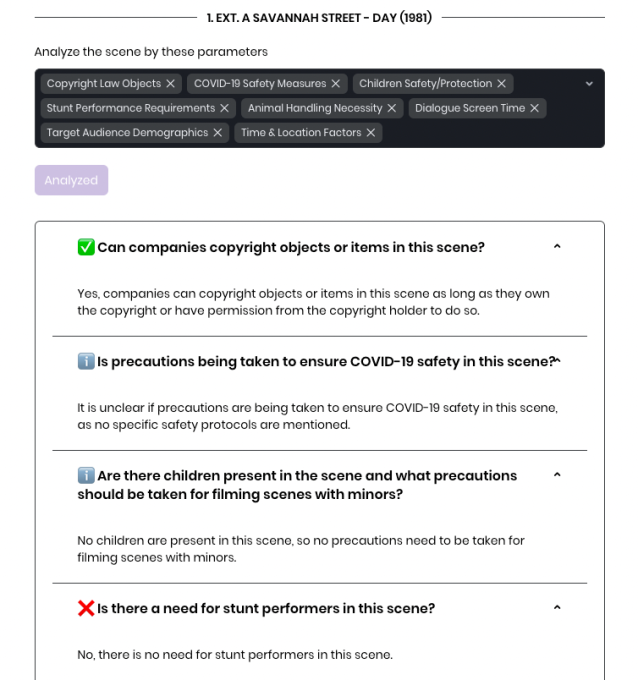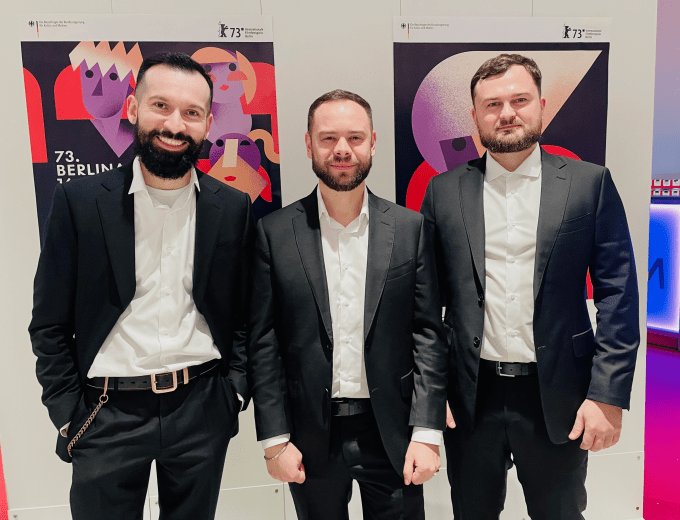An AI platform for the film industry, Filmustage, is today announcing new funding. First launched in 2020, the platform is designed to streamline pre-production in the film industry using a variety of features, such as the ability to break down scripts in a few minutes and categorize them into scenes and elements like props, costumes and characters.
The latest funding, which totals $550,000, includes backing by Flyer One Ventures, Geek Ventures, Vesna Capital, and Imaguru and will go toward an international expansion that will make the product available in multiple foreign languages. For instance, this summer, Filmustage will become available in Spanish, French and German. In 2024, it will roll out in Hindi and Chinese.
Investors like former WhatsApp product designer Anton Borzov and Looksery co-founder Yurii Monastyrshyn, among others, also backed the company.
“We are witnessing how AI is penetrating and fundamentally changing the creative industries,” Vital Laptenok, General Partner at Flyer One Ventures, said in a statement. “Previously, filmmakers only used AI tools in post-production. The pre-production phase lacked innovation, and Filmustage created an effective solution. Today, the global filmmaking market is valued at over $100 billion, and I believe that implementing AI will boost it even further!”
As Filmustage is currently only available in English, becoming available in other languages will allow filmmakers across the globe to use Filmustage in their desired dialect.
The company also plans to use the funding to acquire new B2B customers, which include “several major players in the film industry,” Filmustage told TechCrunch.
The product is mainly known for its script breakdown feature, which highlights characters and other elements like locations, props, extras, costumes, and more. Users can also search for, change, or remove any breakdown element and add new categories. It can then be uploaded as a PDF file or into Final Draft.
Other features include a script summary tool, which gathers all the elements for one scene on a page to determine the number of cast members, props, costumes, locations, vehicles and extras a particular film will need, as well as the reports and references feature, which allow users to add a visual reference to categories with stock images or their own uploads. The visual reference tool is probably handy for set directors that want to visualize props for certain scenes. For instance, what the feather will look like at the beginning of “Forrest Gump.”
The newest tools on the platform are “Scheduling” and “Analysis.” The semi-automatic shooting schedule tool allows users to assign shooting locations to scenes, which day they plan to shoot and an estimation of how many hours each scene will take. Users can upload their schedule into a spreadsheet or into software like Movie Magic Scheduling and Gorilla Scheduling.
The analysis feature uses AI to analyze a screenplay based on different factors that can help filmmakers prepare better and make sure that they don’t forget anything crucial for the pre-production process. This includes animal handling, children’s safety, copyright law objects, stunt performance requirements and even COVID safety measures.
The analysis feature was requested by users who have run into issues after being unprepared for certain situations, co-founder and COO Andrei Karalkou told us.
“We heard a story that this guy wanted to shoot a scene in a desert, but they forgot to order these huge fans for cooling down,” Karalkou said. “So we want to help filmmakers to be prepared and for them to make sure that they don’t forget anything crucial for the [pre-production] process.”
The company also plans to launch integrations with several marketplaces that would allow users to purchase film-related equipment directly on the platform. Users will eventually be able to create a list of items that they need and compare pricing. The tool would likely be helpful for filmmakers with investors that want to see the film budget estimation.
Another feature in the works is a script pitch deck where users can create a pitch in order to potentially get investments for their film.
Overall, Filmustage appears to be a helpful tool for many film departments and employees, above and below the line, such as cinematography, set design, casting, and costume design. One notable user is Roger Christian, Oscar-winning set decorator and director known for his work on “Star Wars.”
Christian spoke about Filmustage during the 2022 European Film Market event. “You have to be experienced to break the rules. It’s like architecture; if you’ve got a grounding in the basis, then you can break the rules. So, what [Filmustage] has done there is broke some rules now because it was actually needed in the marketplace. And I will encourage filmmakers to do this because you need this knowledge,” he said.
Filmustage was co-founded by Belarusians Egor Dubrovsky, Ruslan Khamidullin and Andrei Karalkou, who are film lovers and tech professionals that have known each other since studying at university.
Dubrovsky came up with the idea for the platform while working as a second assistant cameraman for production companies that create TV shows for Netflix and Prime Video.
“I worked for over 10 years in the industry and always wondered why we couldn’t automate some of the most time-consuming processes in filmmaking,” Dubrovsky said. “Even in the U.S., a hotbed for filmmakers, creators face the same problem. Right on the set, I surveyed the first potential clients, and when I returned home, I gathered a team and started working on Filmustage.”
As of February 2023, Filmustage has more than 4,400 registered users, and over 350 paid users, the company claims.
Users can either sign up for the basic plan, which is $49/month and lets you upload three projects per month, or the studio plan, which is $149/month and lets you upload ten projects per month. The platform also offers a seven-day free trial.
Filmustage leverages AI to breakdown film scripts, create shooting schedules and more by Lauren Forristal originally published on TechCrunch








